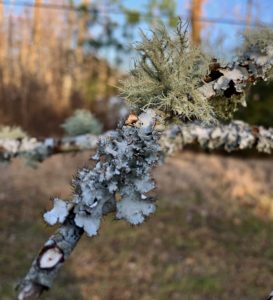By Mary Reid Barrow
Oh, that’s just lichen, I used to say casually when I saw dry, gray-green curly-edged growths on branches and tree trunks.
Not anymore. I learned my lesson recently. How could I have passed off lichen as “just lichen?” It’s so not true.
Lichens are way more complicated I found when I took this photo of a dead tree branch at Stumpy Lake.

Even I could tell the gray-green lichen is different looking–ruffled in a kind of fancy way–from the really common lichen I see.
A fern-like green growth, definitely not part of the tree, is growing in the middle of the lichen. Is the greenery part of the ruffled lichen’s growth, or something unrelated?
I thought I’d find easy answers, but even my book, “A Golden Guide, Non-Flowering Plants,” told me I was in way over my head. And my go-to nature experts agreed with me that lichen is a complicated subject.
“They are a bit overlooked and underappreciated!” Theresa Augustin said. Augustin is the director of environmental engagement and outreach at Norfolk Botanical Garden.
She told me I had two of the three types of lichen in my photo. The “flat leafy one” is called foliose lichen and the “the upright branchy one” is called fruticose lichen.
“The black spidery growths, I believe are just hair-like growths referred to as cilia,” Augustin said.
Crustose is the third type of lichen. It grows almost flat on a tree branch or other surface. One species of crustose has the common name of whitewash lichen, which gives you an idea of what crustose lichen might look like.
Even though lichens species have very descriptive common names, such as dog lichen or toad skin lichen, they are very hard to identify and the two in my photo were no different.
All three types of lichens generally grow where other plants don’t, whether on a dead or live tree, on a rock , on sand or bare soil. They love sun and unpolluted air.
As I starting writing this, I began to recall the photo of British soldier lichen, so named for its red, fruiting tips, that reader John Bunch sent me before I retired my Virginian-Pilot garden column.
The tiny little red-tipped plants were growing on a small log in Sussex County. See more at
https://www.pilotonline.com/life/home-garden/article_e7993ff2-132f-5293-a5de-9009d4fd0cc3.html
I was so blown away by the photo that I didn’t stop to think and find out more. If the British soldiers were a species of lichen, how many more unusual lichens were there out there?
Turns out there are probably 600 different lichens in Virginia alone and more than 3000 in North America, said Maurice Cullen, seventh grade life science teacher at Princess Anne Middle School. I just happened to come across two of them at Stumpy Lake.
I am going to revisit this and figure out what species of lichen are in my photo and how many more species I can find. The next time you are on a walk, take a closer look at what you think is lichen, take a photo and send it to me.
Lichen is not a mold, not a mushroom, not a moss and not a fern. It’s all its own interesting form.
“One thing for sure,” Cullen said, “lichens are really cool.”
Do you have a favorite tree or plant with a story to tell? What relationships have you observed between plants and critters? Who eats whom? Who has babies where? Send an email to maryreid@lrnow.org